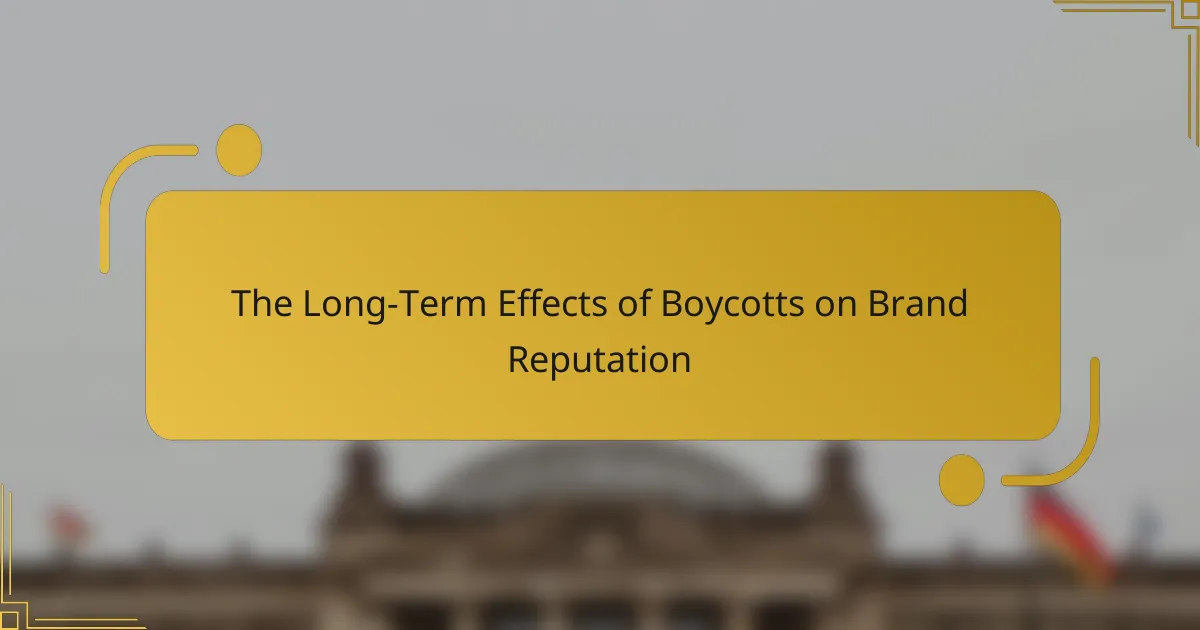Boycotts can have a profound effect on a company’s economic landscape, resulting in reduced sales, volatile stock prices, and lasting harm to brand reputation. The severity of these impacts often hinges on the boycott’s scale, duration, and the company’s market position. High-profile cases in the U.S. illustrate how social and political motivations can drive significant financial repercussions and alter public perception, ultimately affecting consumer behavior and corporate strategies.

How do boycotts affect companies’ financial performance?
Boycotts can significantly impact a company’s financial performance by leading to decreased sales, fluctuating stock prices, and potential long-term damage to brand reputation. These effects can vary in intensity depending on the boycott’s scale and duration, as well as the company’s market position.
Revenue decline
A boycott often results in a noticeable revenue decline for targeted companies, particularly if the boycott gains widespread public support. Sales can drop by low double-digit percentages during active boycotts, especially in sectors where consumer loyalty is crucial.
For example, a company facing a boycott may see a sharp decrease in sales during the boycott period, which can last from weeks to months. Companies should monitor sales trends closely to assess the boycott’s impact and adjust their strategies accordingly.
Stock price fluctuations
Stock prices of companies under boycott pressure can experience significant fluctuations, often reflecting investor sentiment and market reactions. A boycott can lead to a decline in stock value, sometimes ranging from single-digit to low double-digit percentages, depending on the boycott’s visibility and media coverage.
Investors may react quickly to news of a boycott, leading to increased volatility. Companies should communicate effectively with stakeholders to mitigate negative perceptions and stabilize stock performance during such events.
Long-term brand damage
Long-term brand damage is a critical concern for companies facing boycotts, as negative public perception can linger well beyond the boycott’s end. Brands may struggle to regain consumer trust, which can lead to sustained revenue loss and market share decline.
To combat this, companies should engage in proactive reputation management and transparent communication. Addressing the underlying issues that triggered the boycott and demonstrating commitment to change can help rebuild brand equity over time.
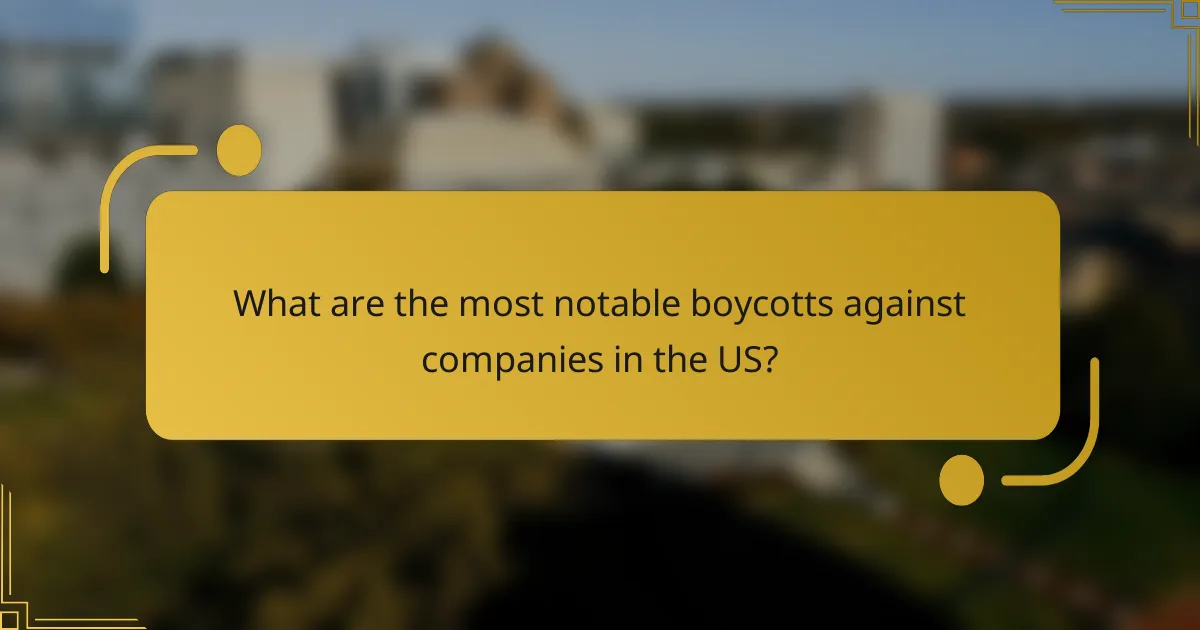
What are the most notable boycotts against companies in the US?
Several high-profile boycotts have significantly impacted companies in the US, often driven by social or political issues. These boycotts can lead to substantial financial consequences and shifts in public perception, influencing consumer behavior and corporate policies.
Target boycott in 2016
The Target boycott in 2016 emerged in response to the company’s policy allowing [censured] individuals to use restrooms corresponding to their gender identity. Opponents of the policy, primarily from conservative groups, initiated a boycott that aimed to express their discontent and influence corporate policy.
As a result, Target faced a notable decline in sales, with estimates suggesting a loss of hundreds of millions in revenue. The boycott highlighted the potential financial risks companies face when engaging in social issues, prompting many to weigh the benefits of inclusivity against possible backlash.
Chick-fil-A boycott
The Chick-fil-A boycott began in 2012 after the company’s president publicly expressed opposition to same-sex marriage. This statement led to widespread criticism and calls for a boycott from [censured] advocates and their allies, who aimed to challenge the company’s stance on social issues.
Despite the boycott, Chick-fil-A continued to experience strong sales growth, indicating that while boycotts can mobilize significant public sentiment, they do not always translate into financial losses for the targeted company. This case illustrates the complexities of consumer loyalty and the varying effectiveness of boycotts.
Nike boycott over Colin Kaepernick
The Nike boycott was sparked in 2018 when the company featured Colin Kaepernick, a controversial figure known for kneeling during the national anthem to protest racial injustice, in its advertising campaign. Critics of Kaepernick’s actions called for a boycott, arguing that Nike was disrespecting the flag and military.
Interestingly, Nike reported a surge in sales following the campaign, demonstrating that aligning with social movements can resonate positively with certain consumer segments. This situation exemplifies how boycotts can backfire, potentially enhancing a company’s brand loyalty among supporters of the cause.
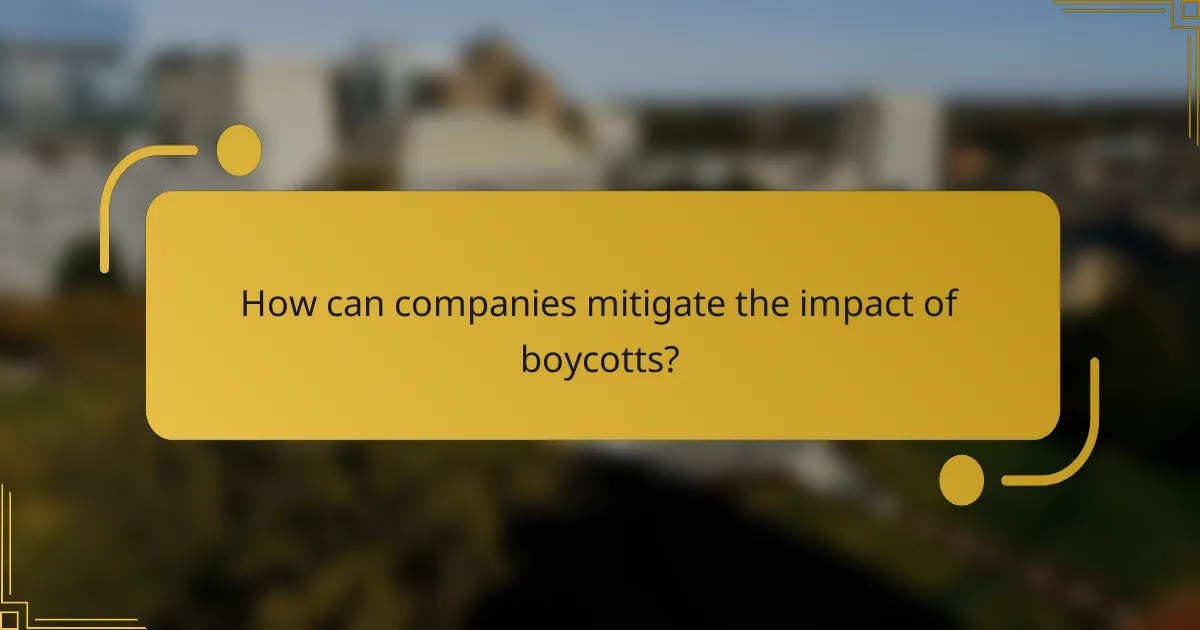
How can companies mitigate the impact of boycotts?
Companies can mitigate the impact of boycotts by implementing proactive strategies that address consumer concerns and maintain brand loyalty. This involves clear communication, stakeholder engagement, and adapting business practices to align with public sentiment.
Effective communication strategies
Clear and transparent communication is essential during a boycott. Companies should promptly address the reasons behind the boycott and outline their response, ensuring that messaging is consistent across all channels.
Utilizing social media platforms can help companies engage directly with consumers, allowing for real-time feedback and dialogue. Regular updates on actions taken to address concerns can reinforce trust and demonstrate accountability.
Engaging with stakeholders
Engaging with stakeholders, including customers, employees, and community members, is crucial for understanding their perspectives and concerns. Companies should consider hosting forums or surveys to gather feedback and demonstrate that they value stakeholder input.
Building relationships with advocacy groups can also be beneficial. Collaborating on initiatives that align with shared values can help to rebuild trust and show commitment to positive change.
Adapting business practices
Companies may need to adapt their business practices in response to the issues raised by a boycott. This could involve revising policies, improving product sourcing, or enhancing corporate social responsibility initiatives.
Regularly reviewing and updating practices to ensure alignment with consumer expectations can prevent future boycotts. For instance, adopting sustainable practices or supporting local communities can enhance brand reputation and customer loyalty.
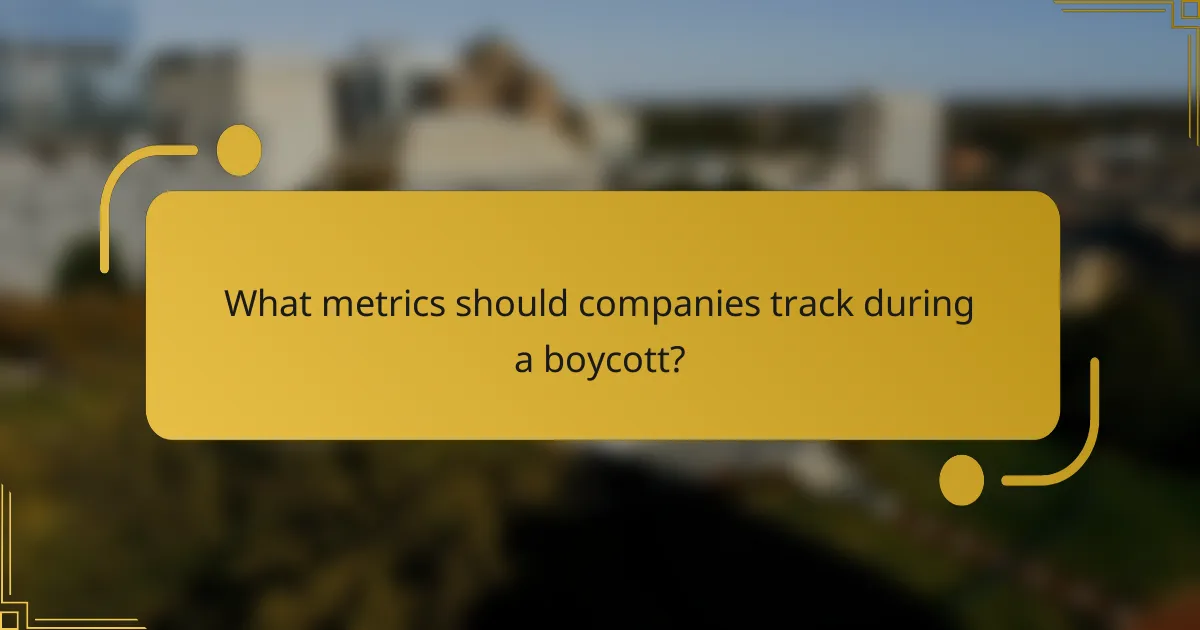
What metrics should companies track during a boycott?
Companies should focus on tracking sales data, customer sentiment, and market share changes during a boycott. These metrics provide valuable insights into the boycott’s impact on business performance and customer relationships.
Sales data analysis
Sales data analysis involves monitoring revenue trends and transaction volumes before, during, and after a boycott. Companies should compare sales figures against historical data to identify significant deviations that may indicate the boycott’s effect.
It is useful to segment sales data by product category or region to pinpoint areas most affected. For instance, a company might see a decline in sales of specific products that are closely associated with the boycott’s focus.
Customer sentiment tracking
Customer sentiment tracking gauges public perception and attitudes toward the company during a boycott. This can be achieved through social media monitoring, surveys, and reviews to assess how customers feel about the brand.
Companies should look for shifts in sentiment scores, which can indicate whether the boycott is causing lasting damage or if public opinion is beginning to recover. Engaging with customers through transparent communication can help mitigate negative sentiment.
Market share changes
Market share changes reflect how a boycott affects a company’s position relative to competitors. Companies should analyze their market share before and after the boycott to understand its impact on overall competitiveness.
Tracking competitor performance during this period can provide context. For example, if a company loses market share while competitors gain, it may indicate that customers are switching brands in response to the boycott.
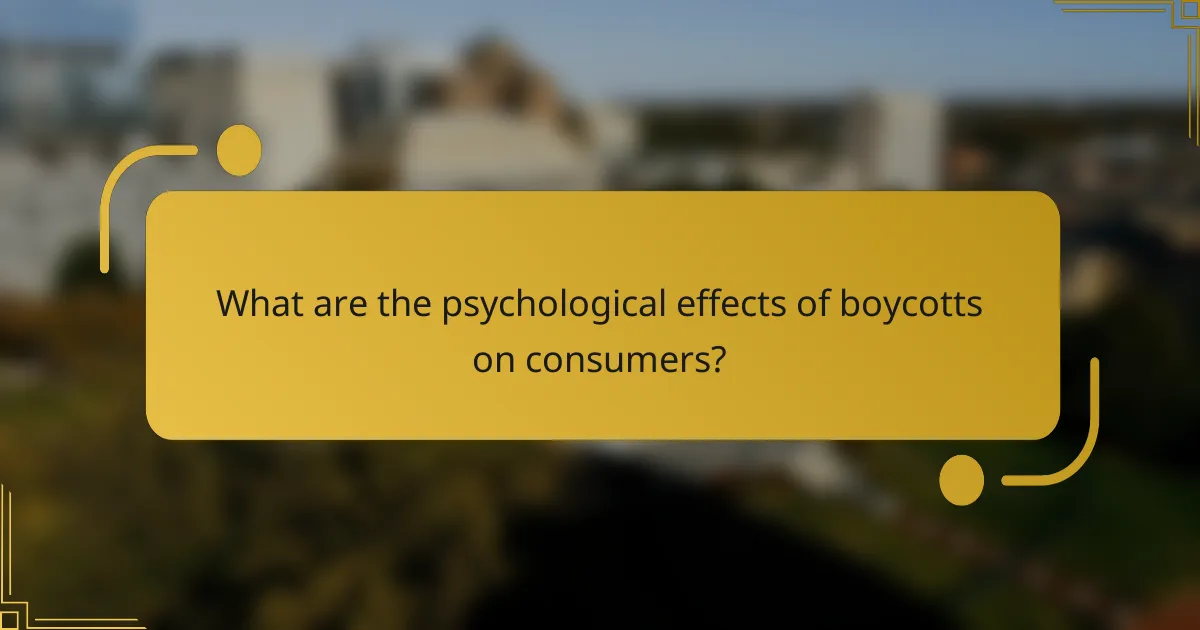
What are the psychological effects of boycotts on consumers?
Boycotts can significantly influence consumer behavior by altering perceptions and emotional connections to brands. These psychological effects often lead to shifts in loyalty, reinforce social identities, and shape views on corporate responsibility.
Consumer loyalty shifts
When consumers participate in a boycott, their loyalty to the targeted company can wane, often leading them to support competitors instead. This shift may be driven by a desire to align with brands that reflect their values or beliefs, especially if the boycott is based on social or ethical issues.
For instance, if a company is boycotted for its environmental practices, consumers may turn to competitors that emphasize sustainability. This change can result in long-term impacts on market share and brand reputation.
Social identity reinforcement
Boycotts often serve as a means for consumers to express their social identities, reinforcing group affiliations and values. Participating in a boycott can strengthen bonds within a community that shares similar beliefs, creating a sense of belonging and collective action.
For example, consumers who boycott a company due to its political stance may feel a stronger connection to others who share their views, enhancing their social identity. This reinforcement can lead to increased advocacy and support for alternative brands that align with their collective values.
Perception of corporate responsibility
The psychological effects of boycotts can also shape consumers’ perceptions of corporate responsibility. When a company faces a boycott, it may be viewed as failing to meet societal expectations, which can damage its reputation and consumer trust.
Consumers often expect companies to act ethically and responsibly. If a boycott highlights a company’s shortcomings in these areas, it can lead to a reevaluation of the brand’s overall commitment to social issues. This perception can influence purchasing decisions and long-term loyalty.
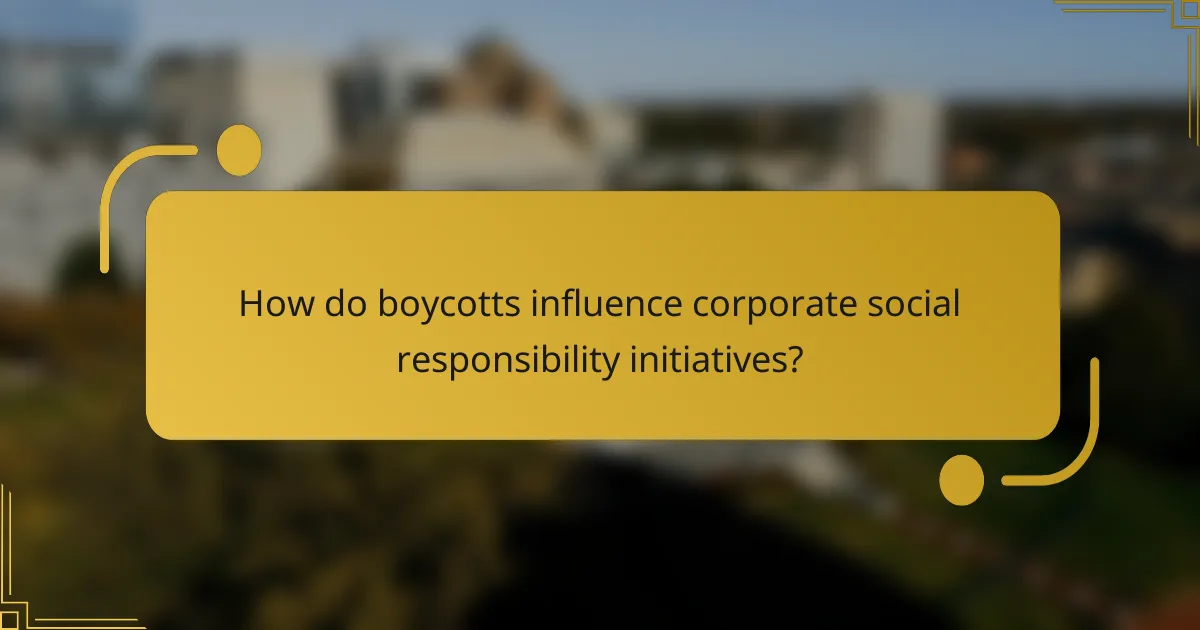
How do boycotts influence corporate social responsibility initiatives?
Boycotts can significantly drive companies to enhance their corporate social responsibility (CSR) initiatives. When consumers withdraw their support, businesses often respond by increasing transparency and improving their ethical practices to regain trust and loyalty.
Increased transparency demands
Boycotts often lead to heightened demands for transparency from companies. Consumers expect clear communication regarding business practices, sourcing, and labor conditions, which can pressure companies to disclose more information than they typically would.
For instance, a company facing a boycott may publish detailed sustainability reports or engage in third-party audits to validate their claims. This shift not only helps in addressing consumer concerns but also fosters a culture of accountability within the organization.
To effectively respond to transparency demands, companies should establish clear channels for communication and ensure that their CSR initiatives are easily accessible to the public. Regular updates on progress and challenges can also enhance credibility and consumer trust.


